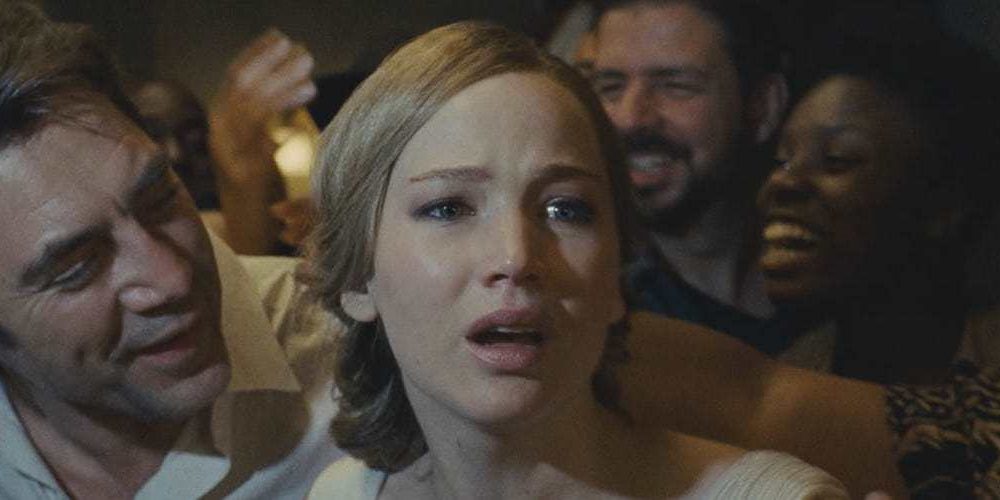“Oh rampant discrimination, mass poverty, third world debt, infectious disease/
Global inequality and deepening socio-economic divisions/
Well, it does in your brain/
And we call upon the author to explain” — Nick Cave, We Call Upon the Author to Explain
***
Director Darren Aronofsky, the writer and director of mother!, has explained his new film. While it is usually uncharacteristic for a filmmaker to explain their work, nonetheless Aronofsky persists to do so repeatedly in interviews. From his interview with Entertainment Weekly, he says:
Everything is connected. That was the breakthrough for me — I had this idea, this allegory with a return to the horror genre and a take on the home invasion genre because I feel like everyone can relate to that feeling of having guests that won’t get the hell out of your house. And turning that into a nightmare could be interesting. But then I thought to try to talk about the people on this planet by using the great stories of the Bible. So I would say every single beat and character is related to the Bible in order — all the way through the Old Testament and the New Testament. That’s the fun — for people to put that together. Even some of the dialogue — and people haven’t picked up on this yet, is verbatim from the Bible.
Indeed, the biblical narrative is so glaring it is almost hard to read it in its metaphorical sense at all. And while many critics have called it an allegory, Aronofsky’s explaining essentially exposes any hidden meaning it might have. All that said, it is not a strictly biblical story. In fact, just as his previous film Noah drew from the Midrash (ancient Jewish interpretive texts), mother! draws from other religions to frame the story, most notably Gaia from Greek Mythology and reincarnation which is found in major Eastern religions such as Buddhism and Hinduism. This mashup of religious influences brings to mind the attempt by some scholars to construct a protomythology, a kind of cornerstone around which all mythology and religions share an origin. Here, such a protomyth is deployed to frame a story about the destruction of our world and the environment and God’s hope for redemption for both the world and mankind.
The story is shot almost entirely in the house shared by Javier Bardem’s Him (as he is referred to in the script) and Jennifer Lawrence’s Mother. Bardem is a frustrated author struggling with writer’s block and Lawrence his younger, affectionate bride who has set to work furnishing and finishing their home. But it quickly devolves into horror—a very specific kind of horror of home invasion (one could pair this with Michael Haneke’s Funny Games for a particularly despairing double feature)—as guests arrive. First come the Man (Ed Harris) and the Woman (Michelle Pfeiffer) who both give excellent performances in small, supporting roles. But soon their sons also arrive and then more and more guests, ultimately climaxing in a sensually overwhelming cacophony of violence, plague, and war made all the more visceral by the claustrophobic cinematography.
mother! is a profoundly intense movie that has a type of affection for the feminine desire of homemaking, but not much optimism for humanity despite Him/the author/God’s hope for it. While based around the Christian Bible (Old and New Testaments), it doesn’t know what to make of the story of Jesus except to treat it as meaningless and horrific, the pointless sacrifice of the deities’ offspring. Indeed, it’s hard to understand the entire story as much else than meaningless and horrific with pointless sacrifices, with only the hope that next time will be different, better. But without us and without anything we know.
This is a horror on a cosmic scale—not psychological horror or a gore fest, although it has some elements of both—not dissimilar from Cosmicism or Cosmic Horror, built around the writings of H.P. Lovecraft, where humans are largely meaningless and insignificant in the great scheme of existence, except mother! grants the existence of God and Gaia and tells the story from their perspective as the humans, mostly faceless and nameless, by turns enact violence against them, grovel before them, adulate them, disregard them. This is an interesting framing, and I think will become a turning point—yet unknown in what way—in Aronofsky’s career as a writer and director. But I am left asking myself many questions…
Who is this film for? Women—a view from the feminine perspective of God? Christians—who will find it heretical? Environmentalists—who might very well ask, “to what end is it worth saving the planet?” Horror film lovers—who will largely be disappointed? I still can’t settle on the answers to any of these questions. Even though the author has explained.








